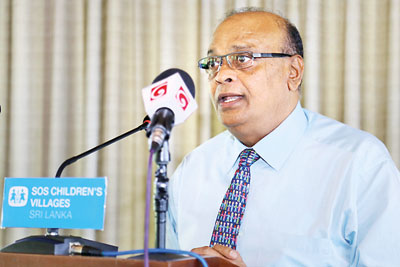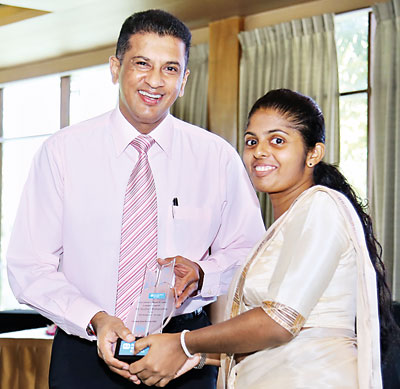‘Never give up on a child’
View(s):
SOS National Director, Ananda B. Karunarathne
SOS Children’s Villages Sri Lanka launch their latest advocacy initiative
By Kaveesha Fernando
‘It takes a village to raise a child’ – the African proverb has become famous because it holds true universally. Children need a loving environment to thrive and face many difficulties when their needs are not met. Such ‘at risk’ children do indeed need a village – or at least a few concerned individuals to help them grow up happily.
It is this principle which has driven SOS Children’s Villages International to provide a virtual village for many children in need of support. SOS Children’s Villages worldwide offer children without a suitable guardian alternative care and the organisation aims to help any and all children in need through their projects.
In tune with these ideas as well as their international theme ‘No Child Should Grow Up Alone’, the SOS Children’s Villages Sri Lanka launched their latest advocacy initiative ‘Never Give Up on a Child’, on July 7 at the Water’s Edge, Battaramulla. Nearly 100 guests representing the state, civil society, the corporate sector and the media were present at the event which also celebrated the 35th anniversary of the SOS Children’s Village Sri Lanka.
National Director, SOS Children’s Villages Sri Lanka, Ananda B. Karunarathne explained that SOS doesn’t merely help children within the villages but also through their various initiatives. He felt that this initiative could help many with the support of the relevant parties. The Never Give Up on a Child initiative aims to engage with all stakeholders in ensuring that all children are well cared for.
 SOS Children’s Village Sri Lanka National Adviser and Advocate ChathuriJayasooriya explained that the main goal of the initiative is for stakeholders to invest in the rights of the child without allowing bureaucracy to get in the way. Asking guests to close their eyes and picture a happy childhood memory, she said that this is what all stakeholders must think of when making decisions for children. “The reason we let bureaucracy get in the way is because we are distant from our emotions and don’t realise how much our decisions affect these children,” she said.
SOS Children’s Village Sri Lanka National Adviser and Advocate ChathuriJayasooriya explained that the main goal of the initiative is for stakeholders to invest in the rights of the child without allowing bureaucracy to get in the way. Asking guests to close their eyes and picture a happy childhood memory, she said that this is what all stakeholders must think of when making decisions for children. “The reason we let bureaucracy get in the way is because we are distant from our emotions and don’t realise how much our decisions affect these children,” she said.
A video testimonial from a youth whose identity was not revealed was played to show how much bureaucracy impedes the development of institutionalised children. “For everything I did in school – from taking part in sports events to sitting for public examinations I needed my birth certificate. Why can’t the relevant authorities understand that there are people who don’t have a birth certificate? In this country in order to have basic rights you need a birth certificate,” he said.
The system needs to support these children without failing them, Chathuri stressed.
The initiative has two main goals. Their first is to work with the government to initiate a de-institutionalisation mechanism – a system which aims to keep children in families and reunite them with their families following institutionalisation as much as possible. The second goal of the programme is to raise awareness among the public.
SOS Children’s Villages Sri Lanka has initiated a pilot project in the Uva Province in collaboration with the Provincial Department of Probation and Child Care Services as a part of this first aim of supporting the government initiate the de-institutionalisation process. The organisation has been providing technical support to the Uva Province in order for the state to reintegrate institutionalised children back into their homes as soon as possible (or provide adequate alternative care) and for them to meet the physical and human resources necessary to improve the standard of both government and privately-run orphanages in the area and lobby with the relevant authorities.

SOS Ambassadors Pooja Uma Shankar and below Roshan Mahanama
Provincial Commissioner for the Department of Probation and Child Care Services – Uva Province, Mrs. O.W.C.S. Priyabashinie felt that this initiative was supporting the officials in her province to help children in need. In her presentation highlighting the issues faced in her province, she identified the main issues which affect the children – such as mothers leaving to the Middle East to work and unsafe housing structures. She felt that there was more which could be done to help the children and stated that there is action being taken to help them. SOS Children’s Villages Sri Lanka hopes that this pilot project will succeed in order for the project to be implemented in other provinces as well.
Their second aim of raising awareness to the plight of ‘at risk’ children has begun with the opening of a ‘talking bus stop’. A first-of-its-kind audio visual bus halt was unveiled near the temple opposite the D. S. Senanayake College in June. The bus halt informs the public about a new referral service offered by SOS Children’s Villages’ Sri Lanka: A Coordination Centre which will link vulnerable families with service providers in order to prevent children from losing parental/family care and being placed in institutional care.
This initiative also attempts to sensitise the public and motivate them to take action to prevent the institutionalisation of children. Given the fact that this is a pilot programme, the coordination centres are only present in the following seven districts – Anuradhapura, Colombo, Galle, Jaffna, Matara, Monaragala and Nuwara-Eliya. Anyone in these districts can call 011-4013933 and report any cases of children at risk of being institutionalised. It should be noted that the centre does not handle cases of child abuse or neglect, only cases where children are at risk of losing their families.
The Never Give Up on a Child initiative also advocates two key changes to the existing policies with regards to institutionalised and at risk children – the first is that authorities keep siblings together when placing them in alternative care and the second is the enhancement of the quality of human resources in childcare institutions. Chathuri felt that the practice of separating siblings when institutionalising or putting children up for adoption is harmful. “Studies show that keeping siblings together has a very positive impact on them because they draw support from one another. We need to ensure that siblings are kept together throughout,” she said.
Chief Guest at the event and Minister of Women and Child Affairs Chandrani Bandara said that there are enough strong laws in place to help children in need but these laws needed to be amended. “We need to look beyond our children receiving food and a roof over their heads and look into the other needs as well,” she said.
Former national cricketer Roshan Mahanama and popular actress Pooja Uma Shankar were appointed SOS Ambassadors to support the organisation with this cause.
To find out more about how you can get involved with this initiative, visit the SOS Children’s Village Sri Lanka website at https://www.soschildrensvillages.lk or call their head office on 011-270 2712. You can also report any cases of child abuse and neglect to 1929.


